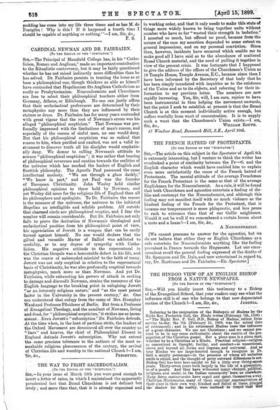THE HINDOO VIEW OF AN ENGLISH BISHOP FROM A NATIVE
NEWSPAPER
[TO THE EDITOR OF THE "SPECTATOR/7
you kindly insert this testimony to a Bishop of the Evangelical School, that your readers may see what the influence still is of one who belongs to that now depreciated section of the Church am,. Sir, &c., JUSTITIA.
Referring. to the resignation of the Bishopric. of Madras by the Right Rev..Frederick Gel],-the Hindu writes (February 7th,1899) —" The Right Rev. F: Gell, D.D., Bishop of -Madras; -retires from service to-day; the 7th (February' 15; 1899, was the actual date of retirement) ' • and in his retirement Madras loses - the: influence of a great character. We are not Christians ; and we cannot pre- tend to be in any sense .enthusiastic about the results of the pro- pagation of the Christian gospel. But a pions man is a pions man, whether he be a Christian or a Hindu. Practical religion—religion as concretised in thought, feeling, and conduct—is nnsectional, above and beyond all forms and dogmas, and universal. And as tree Hindus we are large-hearted enough to recognise in I. Gell a saintly personage—in the presence of whom all sectarian strife is stilled, and the thought of petty outward differences is not. Bishop Gell has-been here -amidst its for a little over thirty-seven years. Thirty-seven years bulk largely in the- life of a generation, as Of a people. ' And they halie witnesitid.many-changes, religious, and social, in the Indian - comtnunity here, as elsewhere. Many -fierce -controversies have raged and spent, themselvee away- Christian Missionaries, many of. them excellent ,repreeeiatatives of their claii in their own way, flinched and „failed at times, the • shadow for the reality, were Inelitteff% bio forget that made of one blood all nations, and unwittingly added to the difficulties their religion had to face and overcome in this land. But in none of this disappointing, soul-damping work could the most observant of us trace anything of Bishop Gell's personality, that has ever towered far above where such aberrant factors work. From the day he landed here he has been the same, shedding II benign influence all round, offending none, irritating none, and taking sides with no one, and yet witnessing unto the beauty of his faith more effectively than all the militant Missionaries about. Orthodox Hindus who have come in con- tact with him bear witness to his worth as eloquently as the most enthusiastio of his followers. And no Christian would . look for a better reward for his religious labours in this land. Christian progress here is not to be measured by the increasing number of converts, but by the growth of appreciation for Christian character. Most men engaged in the work of evangelisation in India do not realise this. But the fact remains, however, that the man who spreads the Gospel most successfully is not he who has made the largest number of converts, but he who has commanded the love and respect of most men whoare not Christians. Such a one has been Bishop Gell. We are as sorry to bid him good-bye as any Christian could be. In sooth, as the new Metropolitan of India said the other day in Bombay, he has held a unique position in the Indian episcopate, as much by reason of his saintly catholicity as by his learning and devotion and length of service."







































 Previous page
Previous page